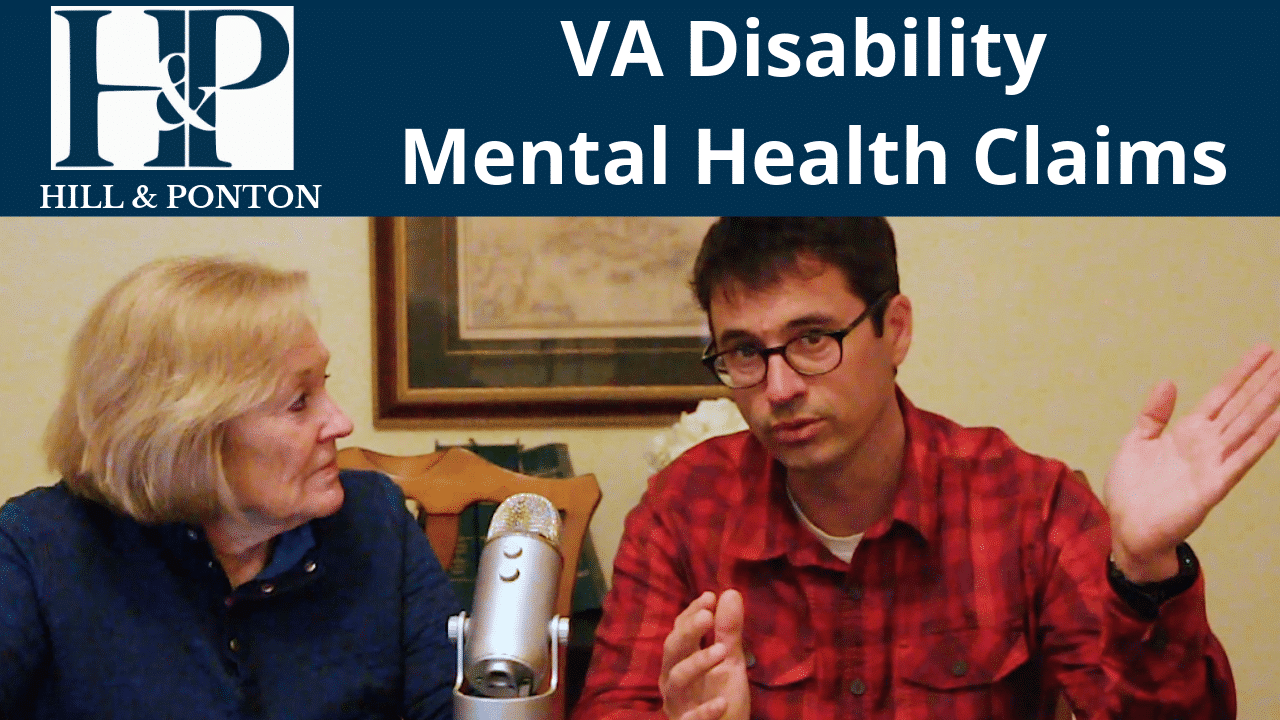Matthew Hill: Hello and welcome to the Hill and Ponton VA video blog. I’m Matthew Hill, here with Carol Ponton. Today, we want to talk to you about mental health conditions and the VA and getting those service connected. And this is an area that Carol and I specialize in. Unfortunately, we see thousands of veterans who have severe mental health conditions due to service and they can have multiple ones. Those who’ve read medical records on this would look on the Axis I and see that, you know, maybe a veteran just has PTSD. But the veteran could also have PTSD, depression, and anxiety, and so all of …
Carol Ponton: Panic attacks.
Matthew Hill: … panic attacks. And where we see veterans get confused and endanger their claims are when they have multiple diagnoses, and they want them all service connected or they believe they should be all service connected. A lot of times, we’ll have a veteran come to us where they have a rating where they’re 30% service connected for PTSD but denied service connection for depression. And they’ll say, “Well, I believe I should be entitled to service connection for depression.” What do you typically say to that, Carol?
Carol Ponton: Well, the thing is you could only be paid for one. Whichever is the worst is all you’re going to be paid for.
Matthew Hill: Meaning one mental health condition?
Carol Ponton: One mental health. So if you are service …
Matthew Hill: They’re graded on the exact same criteria, so the VA won’t give you two …
Carol Ponton: Right. So if you’re service connected for PTSD and for depression, one at 40 and one at 50, you’re only going to get the 50. You’re not going to get the 40 and the 50 combined, so you ought to think about which is the worst and go for that one. Talk about that claim instead of trying to get both of them, because that’s almost like it’s going to cut you in half. You don’t want to do that.
Carol Ponton: So what happens with … Say you have PTSD that’s related to something that happened in the service> but you may have depression that didn’t happen in the service, but it’s come on because you have a service-connected back problem that causes you so much pain and anxiety and you can’t do the things that you wanted to do. You see your family go off to baseball games. You can’t sit on those bleachers, so you become terribly depressed. That may be the better claim to pursue, but you have to think about it. Which affects me the most? But realize you’re not going to get both.
Matthew Hill: You know, one thing I look at is I see, you know, we don’t see cases … The way that the VA wrote the law and the way veterans attorneys are allowed to come in and get into a contract with a veteran is that we see cases that have been adjudicated, meaning cases that already have the decision, cases where the veteran has already entered their claim. And so a lot of times, I’ll get a decision where the veteran is, you know, trying to get, again, service connected with depression. And they get denied, but they’re 30% for the PTSD. My thought is once they’re service connected for a mental health condition, I don’t care what it’s called. I don’t care what the breakup should be. I care about getting the veteran accurately rated and accurately paid.
Carol Ponton: Exactly.
Matthew Hill: Because I kind of think that what happens is they get you on a goose chase, a wild goose chase to go look over here on, “Hey I want to get this service connected.” When in reality, the whole premise of the VA rating system is just to get you the most compensation that you deserve. And so if you’re already service connected for one mental health disability, and that one mental health disability, even if it’s not your worst one, well, the VA has to prove that that the symptoms you have are not related to that service-connected disability. So I try to go with the veteran and say, “Let’s see how much your max rate could be.”
Carol Ponton: Exactly.
Matthew Hill: Because that also preserves what’s called the effective date, meaning how far back that claim can go. Because if you’ve been fighting for a year, you come to us where you realize, “Hey. I want, you know, I’m fighting for service connection for depression and I’ve already been service connected for PTSD.” And then a year later, you file that PTSD increase rating claim. Well, you’ve just lost a whole year of benefits you could have been getting on a higher rate.
Carol Ponton: And say you have PTSD. You also probably have depression, panic attacks, anxiety, so all of these other things are part of the PTSD already.
Matthew Hill: Symptoms of it, right.
Carol Ponton: So if you’re only filing for one, it’s going to be a little harder for them to say, “Oh yeah, that goes with the depression over here that we didn’t service connect.” So stick with … I’m with Matt. Once you’ve gotten service connected for one mental problem, you should try to show how bad that problem is. I usually see it the other way. I see where someone has gotten depression for their back or for the pain that they’re dealing with and they want service connection for PTSD. But maybe the problem with PTSD is we can’t prove the stressor. We can’t prove what happened.
Carol Ponton: Don’t spend your time being really upset about that, because we can work with the depression and get that up so that you’re getting the highest rating for that. That’s the problem I see is veterans will worry so much that they’re not getting service connected for something, but not realize it’s not really going make a difference to you.
Matthew Hill: Yeah, and there’s more ways …
Carol Ponton: Exactly.
Matthew Hill: … more than one way to get what you deserve. And, you know, as Carol said, it’s getting the outcome, not necessarily the label. This system’s not about the labels. This system is about getting you the benefits you deserve.
Carol Ponton: Exactly.
Matthew Hill: Well, thank you for tuning in today and we look forward to seeing you again here soon.




